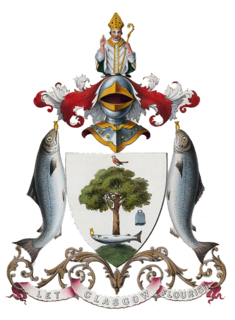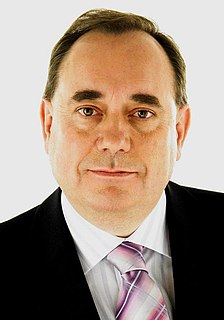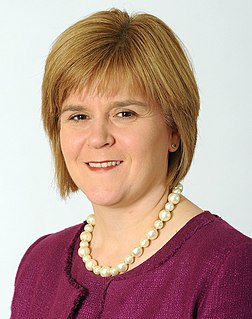
Glasgow City Council, the local government body of the city of Glasgow, Scotland, became one of the newly created single tier local authorities in 1996, under the Local Government etc. (Scotland) Act 1994, with boundaries somewhat different from those of the City of Glasgow district of the Strathclyde region: parts of the Cambuslang and Halfway and Rutherglen and Fernhill areas were transferred from the city area to the new South Lanarkshire council area.
Scotland is a country which is currently in a political union with the rest of the United Kingdom. Having been directly governed by the UK Government since 1707, a system of devolution was established in 1999, after the Scottish people voted by a firm majority to re-establish a primary law making Scottish Parliament in a referendum held in 1997.
The Unionist Party was the main centre-right political party in Scotland between 1912 and 1965.
The Scottish Labour Party is the devolved Scottish section of the UK Labour Party.
The Monklands East by-election was held on 30 June 1994, following the death of the Leader of the Labour Party John Smith, Member of Parliament (MP) for Monklands East in Scotland, on 12 May.

The 2011 Scottish Parliament election was held on Thursday, 5 May 2011 to elect 129 members to the Scottish Parliament.

The 2007 Scottish Parliament election was held on Thursday 3 May 2007 to elect members to the Scottish Parliament. It was the third general election to the devolved Scottish Parliament since it was created in 1999. Local elections in Scotland fell on the same day.

The Scottish Protestant League was a political party in Scotland during the 1920s and 1930s. The League was led by Alexander Ratcliffe, who founded it in 1920.
The Progressive Party was a municipal political organisation that operated in several Scottish cities and towns in the 20th century. It was based on tacit anti-Labour co-operation between the Unionist Party, Scottish Liberals and independents.
George Andrew Leslie is a Scottish National Party politician and a veterinary surgeon. He was the SNP's Senior Vice-Chairman 1969–1971.

The 2012 Scottish local elections, were held on 3 May, in all 32 local authorities. The Scottish National Party (SNP) overtook Labour to win the highest share of the vote, and retained and strengthened its position as the party with most councillors. Labour also made gains, while the Liberal Democrats experienced meltdown, falling behind the Conservatives. For the first time since the introduction of the Single Transferable Vote system, the SNP won majority control of 2 councils, from no overall control. Labour also won majority control of 2 councils from no overall control, while retaining majority control over 2 councils.

The Glasgow Pollok by-election of 9 March 1967 was held after the death of Labour MP (MP) Alex Garrow:

The 2015 United Kingdom general election in Scotland was held on 7 May 2015 and all 59 seats were contested under the first-past-the-post electoral system. Unlike the 2010 general election, where no seats changed party, the Scottish National Party (SNP) managed to win all but three seats in Scotland in an unprecedented landslide gaining a total of fifty-six seats and also become the first party in sixty years to win 50% of the Scottish vote. It saw the Labour Party suffer its worst ever election defeat within Scotland losing 40 of the 41 seats they were defending, including the seats of Scottish Labour Party leader Jim Murphy and also the then Shadow Foreign Secretary Douglas Alexander. The Liberal Democrats lost ten of the eleven seats they were defending with the then Chief Secretary to the Treasury Danny Alexander and former leader Charles Kennedy also losing their seats. The election also saw the worst performance by the Conservative Party which received its lowest share of the vote since its creation in 1965, although it retained the one seat that it previously held. In all, 50 of the 59 seats changed party, 49 of them being won by first-time MPs.
The Moderates were a municipal political organisation operating in Scotland in the early 20th century. The group was based on tacit anti-Labour co-operation between local Unionist Party, Liberal and Independents politicians. The Moderates dominated Glasgow Corporation until the 1933 election, when the rise of the Scottish Protestant League split the Moderate vote and allowed Labour to gain control of the council for the first time.

The 1933 Glasgow Corporation elections were held on 7 November 1933. The results were devastating for the Moderates, who lost control of the Corporation to Labour for the first time, despite socialist candidates making gains in Glasgow at successive general elections. Labour’s victory came as a surprise, even to the party itself, which had already begun blaming its anticipated defeat on vote-splitting caused by the presence of the ILP & the Communists. Labour's dominance of the Corporation would continue, nearly unbroken, to the present day.

An Election to the Edinburgh Corporation was held on 7 May 1968, alongside municipal elections across Scotland. Of the councils 68 seats, 22 were up for election. Despite receiving the most votes of any single party, the SNP won only 7 seats. Unlike in Glasgow, the Progressives and Conservatives did not run on a joint ticket. Despite that however the parties only ran competing candidates in the Gorgie-Dalry ward.
Scottish local elections were held in 1967 to elect members to the various Corporations, Burghs, and County Boards of Scotland.

An Election to the Edinburgh Corporation was held on 2 May 1972, alongside municipal elections across Scotland. Of the councils 69 seats, 23 were up for election.

Elections to the Corporation of the City of Glasgow were held on Tuesday 3 November 1896, alongside municipal elections across Scotland, and the wider British local elections.
The 1896 United Kingdom local elections took place in late 1896 for municipal councils, as well as Rural districts. Municipal elections were held across England and Wales on Monday 2 November, with Scotland holding municipal elections the following day. Municipal elections in Ireland took place later that month, on Wednesday 25 November.










